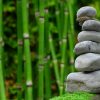Have you ever heard the word vacuity?
First time I heard this word was in a meditation class. I did not actually fully understand it. The theory provided by the teacher was kind of difficult for me. In general, Buddhist philosophy to me is very interesting but also full of concepts and words that are not so easy to comprehend. Vacuity used to be one of them.
My Thai meditation teacher always says 99% practice and 1% theory.
The truth is that this is not only a good advice for your meditation development but also a very good advice for understanding Buddhist philosophy.
Take a look at this wooden block:

Before this block was a tree, now – a bock, in the future it will disintegrate and disappear. Then, is this really a block? Everything that changes does not actually exist.
Everything is changing
The concept of me is also changing. Right now I am 35 years old, I teach yoga and meditation and work in communications. But what about next year? I won’t be 35 anymore. I might not be teaching yoga, meditation or working in communication, so myself dissolute in vacuity because of changes.
If me is changing, then it does not exist as a description composed of external aspects as age or profession. Wen I feel happy, who is feeling happy? When I feel worried, who is feeling worried? The answer is nobody. It is vacuity. It does not exist.
Connecting to the Divine
This concept can be very hard to understand just by reading these words but my meditation practice did help me getting it.
When I go deep in meditation, the concept of me as composed by external concepts disappear. I am not anymore my body what I perceive with my senses; I am not my age, my profession or my work. I am something that is deeply inside me, a state of pureness, emptiness and stability which goes beyond happiness. It is just a word that can be described in a text.
When I go deeply in meditation, I connect to what you can call soul, spirit or the Divine.
That is vacuity – the dissolution of me perceived in my meditation.
That’s when I got the point of my Thai meditation teacher: 99% practice and 1% theory.


